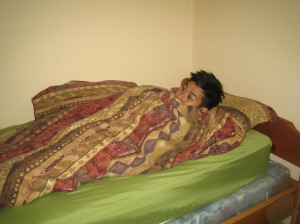Everyone at any time or another can feel fatigued after eating a meal or a big dinner and it is normal, but it could be a problem when the person feels tired and exhausted after each meal. Severe tiredness can slow down daytime activities and also disrupts work and many find it difficult to cope up. Feeling fatigued or exhausted after a meal is also an indication of some bodily conditions such as weakness in the muscles, excessive sleepiness and being drained out.
Causes of fatigue after eating

- Eating excessive amounts of sugary foods during meals such as eating of sweets and desserts with meals can result to a sudden rise in the blood sugar level as it is absorbed quickly. The affected person feels energized for a while and the level suddenly slumps and the body cannot bear it anymore, thus resulting to tiredness and sleepiness.
- If the individual suffers from coronary artery disease, he/she can feel fatigued after eating.
- Chronic depression can cause sleepiness after a meal, especially if the person is suffering from anorexia nervosa which is an eating disorder.
- Eating large meals, especially foods that consist of fats and fast food can cause tiredness and sleepiness. The fats are hard to digest and in the process more energy is used which results to tiredness and being fatigued.
- Allergies to certain kinds of food can make the body tired
- Conditions such as hypothyroidism, overeating, anxiety and kidney disease can also cause fatigue after eating.
Treatment and home remedies of fatigue after eating
- Avoid consumption of sugary items and fatty foods in the diet. An alternative is to eat sweet fruits instead.
- Perform exercises regularly in order to keep the metabolism of the body running as well as making the person less tired after every meal.
- Eat smaller meals every day such as 5-6 times every day in order to help maintain a balance in energy and also prevent fatigue throughout the day.
- Avoid eating fast food and processed foods such as cheese, bacon, tinned vegetables, bread and drinks such as milk and soft drinks.
- Eat a variety of vegetables since the fibers in vegetables helps minimize fatigue after eating.
- Eat foods that are rich in iron, protein and carbohydrates. These can help increase hemoglobin which is responsible in carrying oxygen to every cell in the body and keeps the body energized all the time.
- Avoid overeating and drink water after every meal in order to keep the body hydrated.
- Avoid foods that causes allergy.
- Try to include apple cider vinegar in the diet. You can mix apple cider vinegar with warm water and drink it before a meal. This helps with indigestion when eating greasy foods and also rich in dietary fibers known as pectin.
